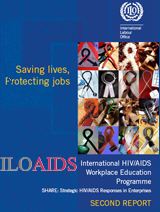
Feature Story
ILO sees significant improvement in workplace attitudes to HIV
25 April 2008
25 April 2008 25 April 2008
"Saving lives, protecting jobs" is a
new report from the ILO project
Strategic HIV/AIDS Responses in
Enterprises
Better HIV policies and practices in the workplace have led to more supportive attitudes towards co-workers living with HIV, the International Labour Organization (ILO) reports in its new publication “Saving lives, protecting jobs”.
The report summarizes the activities of the Strategic HIV/AIDS Responses in Enterprises (SHARE) project active in over 650 workplaces in 24 countries, covering almost one million workers.
“Several countries offer outstanding examples of how they address HIV/AIDS using the workplace for prevention, care and support, and to tackle stigma and discrimination,” said Director of the ILO Programme on HIV/AIDS and the world of work, Dr Sophia Kisting.
The report includes data on the impact of workplace HIV activities and non-discrimination policies. This data was gathered by the ILO over the past four years from six pilot countries – Belize, Benin, Cambodia, Ghana, Guyana and Togo.
In each of the six pilot countries, workers demonstrated “a marked improvement” in attitudes towards people living with HIV and employers’ and workers’ groups are increasingly making use of the ILO’s Code of Practice on HIV/AIDS
In Ghana, the percentage of workers who reported having a supportive attitude towards co-workers living with HIV increased from 33 per cent to 63 per cent. In all six countries surveyed, the proportion of workers who reported supportive behaviour towards co-workers living with HIV rose from 49 per cent to 63 per cent on average during the life of the programme.
In addition to tracking changes in attitudes related to HIV, the new report also presents a series of good practices and data collected from workplaces, ministries of labour, employers’ and workers’ organizations collaborating with the ILO.
The data also showed a rise in all six countries in the percentage of workers who reported using condoms with non-regular partners from 74 per cent to 84 per cent.
Success in developing HIV policies is firmly rooted in the collaboration between workers’ and their employers’. With 33 million people living with HIV, the majority of whom are still working and in their most productive years, the workplace is an important forum for addressing HIV.
It can be one of the most effective settings for responding to the AIDS epidemic as workplaces are communities where people come together to discuss and learn from one another. Existing structures and facilities can also be used for prevention, care and support services.
ILO plan to hold a series of events in a campaign to highlight HIV and the world of work. The report will also be presented to the global AIDS community at the International AIDS Conference in Mexico on 3-8 August.
ILO sees significant improvement in workplace att
Policy and guidelines:
Key operational guidelines of the UNAIDS Programme
Technical Policies of
the UNAIDS programme
Workplace - Umbrella Policies
Cosponsors:
International Labour Organization (ILO)
Feature stories:
AIDS: everybody’s business (26 January 2006)
External links:
Stories from the field - The ILO/USDOL International HIV/AIDS Workplace Education Programme
Publications:
Saving lives, protecting jobs. SHARE Report April 2008 (3.7 Mb, pdf) ( fr )
ILO Code of Practice on HIV in the workplace


